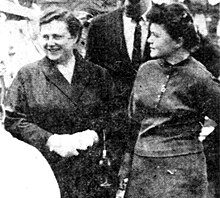
Back Nina Wassiljewna Popowa German Nina Vasiljevna Popova Dutch Nina Popowa Polish Попова, Нина Васильевна Russian Попова Ніна Василівна Ukrainian 妮娜·波波娃 Chinese
Nina Popova | |
|---|---|
Нина Васильевна Попова | |
 Popova and her daughter Renita Grigoryeva observing the linotype machines at the Detroit Free Press, 1960 | |
| Born | Nina Vasilyevna Popova 22 January 1908 |
| Died | 30 May 1994 (aged 86) |
| Occupation(s) | Civil servant, women's rights activist |
| Years active | 1924–1977 |
Nina Vasilyevna Popova (Russian: Нина Васильевна Попова; 22 January 1908 – 30 May 1994) was a Soviet civil servant and women's rights activist. Orphaned at the age of twelve, she lived for two years in an orphanage before being reunited with her brother. She did not complete her secondary education because she needed to work. After training youth for the pioneer movement, she moved to Tambov, where she attended the Soviet Party School, after which she taught trade union officials and worked in the regional museum. She was sent to Leningrad to continue her education in 1930, but left after one year to join her husband who was studying in Moscow. After completing studies at the Moscow Institute of Philosophy, Literature, and History in 1934, she became a vice rector at the Moscow Marxist–Leninist University for Science, Technology, and Engineering Workers.
In 1937, Popova began working as a secretary for the Communist Party. She worked for the Committee of the Krasnopresnensky District, the most important in Moscow. She was appointed chair of the district in 1941 and during World War II was responsible for maintaining district functions and security. Her efficiency in preparing the district for war resulted in her being honored in 1941 with both the Order of the Badge of Honor and Order of the Red Star. Also in 1941, she was one of the founders of the Antifascist Committee of Soviet Women (AKSZh), serving as its chair from 1945 to 1968. Popova was also a founding member of the Women's International Democratic Federation (WIDF) and served as a vice president of the organization from 1945 to 1967. From 1945 to 1957, she was secretary of the All-Union Central Council of Trade Unions. Elected as a deputy of the Supreme Soviet of the Soviet Union in 1950, she served consecutive terms from the third to ninth sessions.
Popova was chair from 1957 to 1976 of the executive council of the All-Union Society for Cultural Relations with Foreign Countries (VOKS), and a full member of the Central Committee of the Communist Party from 1961 to 1976. She was known for supporting policies and actions which improved international relations and for her skill in utilizing her networks and party positions to press for legislation to improve the status of women. In recognition of her work, she was honored with the Lenin Peace Prize for Strengthening Peace among Nations in 1953, received the Order of Lenin and the Order of the Red Banner of Labour twice, and was recognized with the Order of the October Revolution. Gender studies scholar Alexandra Talavar stated that Popova's role in the fight for women's agency in the era between Stalin and Brezhnev was pivotal. She also believed that study of Popova's life confirmed that women's advances in the period resulted from the significant efforts of women activists.
© MMXXIII Rich X Search. We shall prevail. All rights reserved. Rich X Search